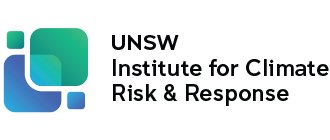Our research

What does it mean to respond to climate risk?
In the past decade, climate risk has evolved from a problem existing within the physical sciences to one that affects almost every economic sector. Industries are now well-aware that climate change poses major challenges in the form of economic, social and governance risks.
Governments, businesses and other organisations understand the need to act. Many are already reducing their carbon footprint. They are also acutely aware of the pressing need to protect their own operations and physical assets from current and future climate impacts. Climate-related reporting and regulatory requirements also call for greater climate knowledge and awareness. The way forward is appropriate mitigations and actions to address risk, as well as investment in adaptation and resiliency strategies.
The ICRR brings together a unique blend of expertise in climate science, behavioural science, economic science, law and governance in order to help industry action these changes.
Our team investigates climate risks across governments and industries. This includes not only identifying and measuring risks, but also how they will play out. We then develop specific advice on how to approach and manage these risks.
At ICRR, we translate and communicate climate science so that it is accessible and usable by industry leaders and their stakeholders. We also help facilitate climate-risk decision-making with key governance and assurance guidance.
Research impact
How Australian and Pacific universities are collaborating for COP31
If Australia secures its bid to host COP31 with Pacific island nations, it will be one of the largest and most significant diplomatic events in the country's history. This briefing note, co-authored by the UNSW Institute for Climate Risk & Response and the COP31 Universities Alliance, outlines everything you need to know about COP31 and the pivotal role Australia and Pacific nations could play as global climate leaders.
Working with uncertainty in climate planning and adaptation
Climate model simulations provide insights into potential future scenarios, each with varying levels of uncertainty. This briefing note, developed in collaboration with the ARC Centre of Excellence for Climate Extremes, explores the critical role of uncertainty in climate projections for informed decision-making and effective adaptation planning.
Key themes
Creating climate translators
Climate risk has impacts at local and global scales. It affects socio-economic activity at the individual, organisation, government to global body levels. Communicating with such a diverse group of decision-makers presents considerable challenges. A key objective of the Institute is the establishment and training of climate translators – a new group of professionals who are equipped to translate complex climate information compiled from observations, meteorological reanalyses, and near and long-term model predictions into accessible and practicable information for non-expert users and decision-makers.
Linking behavioural science, climate science and action
Improving climate risk management requires a deep understanding of human behaviour. To date the behavioural sciences have had limited impact on the development of climate models. Research at the ICRR will focus on closing this gap by working on methods to link established models of human behaviour with models of how our climate will evolve. This approach affords more detailed predictions about consumer behaviour, business decision-making and the impacts of policy innovation in the face of our changing climate.
Providing a holistic approach to addressing climate risk
Mandated and voluntary reporting requirements are increasingly focused on how industry responds to climate risks. The expectation is that industry adopts an informed and comprehensive approach that considers climate risks as impacting social, environmental, and economic issues. Addressing these various needs and expectations is complex and demanding but is now an essential facet of maintaining the ‘social license to operate’ and impacts the bottom line. Drawing on its considerable expertise across science, business, legal and human rights and environmental disciplines the Institute will aim to progress research in this area that can be translated into accessible and holistic advice for industry and government. It will also be used to inform the content and design of professional education and training products.



